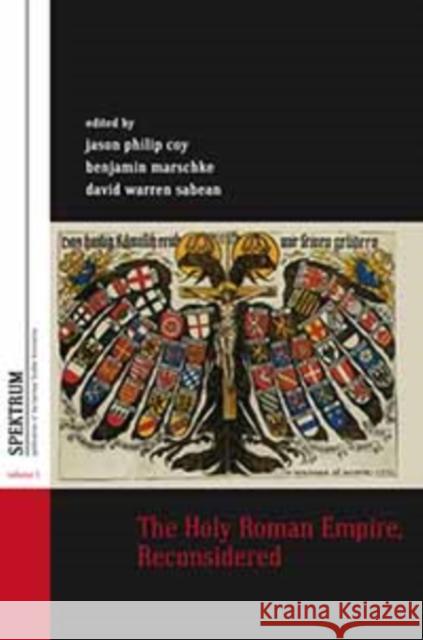The Holy Roman Empire, Reconsidered » książka
The Holy Roman Empire, Reconsidered
ISBN-13: 9781845457594 / Angielski / Twarda / 2010 / 346 str.
The Holy Roman Empire, Reconsidered
ISBN-13: 9781845457594 / Angielski / Twarda / 2010 / 346 str.
(netto: 483,13 VAT: 5%)
Najniższa cena z 30 dni: 503,14
ok. 22 dni roboczych.
Darmowa dostawa!
"Over the last two decades historians have promoted the Holy Roman Empire from a creaking fossil ready for history's ax to a relatively effective government of a decentralized, highly diverse polity. This well-edited volume by a distinguished international corps of specialists offers the most current views on political Germany from around 1500 to around 1800. The perspectives range between two views: the Empire as the forerunner of modern German states; the Empire as an example of a typically premodern political culture. Readers who know only what textbooks say about Germany before 1800, are in for a surprise." - Thomas A. Brady Jr., University of California, Berkeley "Whereas a revised view of the Empire is now part of the historiography in Germany it is not yet widely known among Anglo-American scholars. O]ne of the important contributions of this volume] is that it makes some of these revisionist approaches to the Old Empire accessible...I know of no other work that offers such a rich spectrum of approaches to the Old Empire." - Thomas Robisheaux, Duke University Jason Philip Coy is an Associate Professor of History at the College of Charleston, in Charleston, South Carolina. He has received a DAAD Research Grant and a Maria Sibylla Merian Fellowship for Postdoctoral Studies from the University of Erfurt, Germany. He is the author of Strangers and Misfits: Banishment, Social Control, and Authority in Early Modern Germany (2008). Benjamin Marschke is an Associate Professor of History at Humboldt State University in Arcata, California. He has held fellowships from the DAAD, the Fritz Thyssen Stiftung, and the Max Planck Institute for History. He has published Absolutely Pietist: Patronage, Factionalism, and State-Building in the Early Eighteenth-Century Prussian Army Chaplaincy (2005). David Warren Sabean is Henry J. Bruman Professor of German History at the University of California at Los Angeles. He has been the recipient of an Alexander von Humboldt Foundation Research Prize. He is a fellow of the American Academy of Arts and Sciences. His publications include Property, Production, and Family in Neckarhausen, 1700-1870 (1990); Kinship in Neckarhausen, 1700-1870 (1998). He is co-editor with Simon Teuscher and Jon Mathieu of Kinship in Europe: Approaches to Long-Term Development (1300-1900) (2007).
"Over the last two decades historians have promoted the Holy Roman Empire from a creaking fossil ready for historys ax to a relatively effective government of a decentralized, highly diverse polity. This well-edited volume by a distinguished international corps of specialists offers the most current views on political Germany from around 1500 to around 1800. The perspectives range between two views: the Empire as the forerunner of modern German states; the Empire as an example of a typically premodern political culture. Readers who know only what textbooks say about Germany before 1800, are in for a surprise." · Thomas A. Brady Jr., University of California, Berkeley"Whereas a revised view of the Empire is now part of the historiography in Germany it is not yet widely known among Anglo-American scholars. [O]ne of the important contributions of [this volume] is that it makes some of these revisionist approaches to the Old Empire accessible...I know of no other work that offers such a rich spectrum of approaches to the Old Empire." · Thomas Robisheaux, Duke UniversityJason Philip Coy is an Associate Professor of History at the College of Charleston, in Charleston, South Carolina. He has received a DAAD Research Grant and a Maria Sibylla Merian Fellowship for Postdoctoral Studies from the University of Erfurt, Germany. He is the author of Strangers and Misfits: Banishment, Social Control, and Authority in Early Modern Germany (2008).Benjamin Marschke is an Associate Professor of History at Humboldt State University in Arcata, California. He has held fellowships from the DAAD, the Fritz Thyssen Stiftung, and the Max Planck Institute for History. He has published Absolutely Pietist: Patronage, Factionalism, and State-Building in the Early Eighteenth-Century Prussian Army Chaplaincy (2005).David Warren Sabean is Henry J. Bruman Professor of German History at the University of California at Los Angeles. He has been the recipient of an Alexander von Humboldt Foundation Research Prize. He is a fellow of the American Academy of Arts and Sciences. His publications include Property, Production, and Family in Neckarhausen, 1700-1870 (1990); Kinship in Neckarhausen, 1700-1870 (1998). He is co-editor with Simon Teuscher and Jon Mathieu of Kinship in Europe: Approaches to Long-Term Development (1300-1900) (2007).











